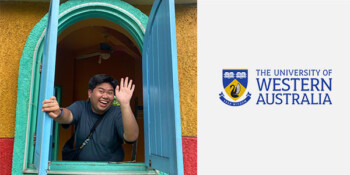Mark Abarquez is a New Colombo Plan Mobility Grant recipient from The University of Western Australia. Mark undertook the Public Health Study Tour in January 2024. Mark is studying Bachelor of Biomedical Science.
Q:Why did you decide to undertake the ACICIS Public Health Study Tour?
I decided to undertake the ACICIS program, particularly the PHST, because I really wanted to gain experience as to the health challenges that are being faced in our neighbouring countries, such as Indonesia. The PHST seemed like (and proved to be) the perfect opportunity for me to delve into my interest in public health challenges as well as how health system works.
Q: Did you receive a New Colombo Plan Mobility Grant? If so, how did this contribute to your experience in Indonesia?
I did receive a New Colombo Plan Mobility Grant! It honestly took such a big weight off my shoulders. Having received the grant, I wasn’t having to worry about working extra shifts or foregoing certain things just to save money for the study tour. I found the NCP grant to be extremely valuable and I am very grateful to the Australian Government for this opportunity. It truly made my experience in Indonesia very accessible and worry-free.
Q: What did you find to be the most challenging about your experience on the PHST?
I think personally for me, the most challenging part about my experience was the very first few days of the tour. I was quite ill during the beginning of the tour and so I was just locked away in my room at the start. For me this was probably the most challenging part during the tour as I wasn’t able to meet and interact with my cohort initially and I wasn’t able to focus on the presentations and the content being discussed. Thankfully, Anisya and the ACICIS team took great care of me as they offered assistance and constantly checked up on me until I had felt better
Q: What public health issues in Indonesia have you become more interested in/aware of as a result of this tour?
Going into Indonesia, I had a vague understanding as to the possible public health issues present in the country. The PHST has really opened my eyes to the many public health problems that Indonesia is currently facing, which includes the rise in tobacco use amongst youth, the lack of enforcement on Food Safety regulations, stunting (which, prior to attending this tour, I had no knowledge about this issue), waste mismanagement, as well as dengue and malaria. The most interesting takeaway I have from these public health issues is that the solutions currently in place – and are proving to effective, are community-based, local solutions implemented in the regions of Indonesia. Whilst central government support is vital and plays a crucial role in ensuring the sustainability of these initiatives, it is quite inspiring to see the community coming together for a common goal.
Q: What was your favourite field trip? Explain why.
My favourite field trip would probably be visiting the Puskesmas and the Posyandu. It was really eye opening to witness how the healthcare system in Indonesia worked, particularly in regard to the wide range of services available for citizens in the Puskesmas. From the dentists, the psychologists, the nutritionist, the environmental officers and many more, it was great to see how the system worked, and how the puskesmas is the first point of contact in their healthcare system and if need be, patients will be referred to the Rumah Sakit for more extensive treatment and services. I also learnt that their Rumah Sakit’s are tiered, from your local hospital all the way up to the national level hospitals they are given a letter which tiers them as to what kind of services they have on offer so that the patient will be able to see which type of hospital is better suited for them. The Posyandu was really heart-warming, seeing the children and their mothers there as well as the amazing ladies that volunteer and help out to ensure that the future generations of Indonesia were healthy and receiving proper nutrition, as they do routine check-ups to kids, give food + medication as well as providing space for mothers to connect with other mothers and for the children to play with one another. It was really touching and quite a privilege to attend those field trips.
Q: How do you think the Public Health Study Tour will influence your future career or studies?
As an aspiring clinician, the PHST has really broadened my knowledge in the realm of public health and has allowed me to gain insight in how a public health system worked and the importance of having a comprehensive and inter-connected health care system. I walk away from this experience with profound knowledge, as well as inspired by the people who we had the privilege of meeting during this tour as I too, want to make an impact in this world.
Q:What did you most enjoy about the seminar series?
I think what I enjoyed the most about the seminar series was just having the chance to listen to a variety of lecturers, professors and doctors. Their experience in their field and the depth of knowledge they had with the topics made the seminars very engaging and comprehensive.
Q: What was your favourite aspect about visiting Indonesia?
There are way too many things that I enjoyed in Indonesia, but if there was one thing that really stands out is the hospitality of the people in this country as well as meeting new people. I felt so at home in Indonesia and the people were all so lovely! From the hotel staff, the merchants, the UI staff, the UI buddies, our Yogyakarta buddies and the ACICIS team, I felt so welcome and so comfortable!! Terima kasih for your hospitality!!!


